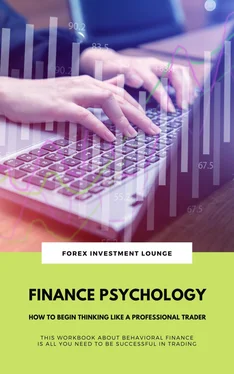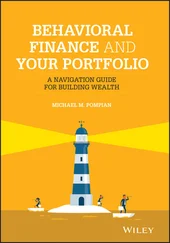Finance Psychology:
How To Begin Thinking Like A Professional Trader
(This Workbook About Behavioral Finance Is All You Need To Be Successful In Trading)
Reproduction, translations, further processing or similar actions for commercial purposes as well as resale or other publications are not permitted without the written consent of the author.
Copyright © 2020 - FOREX INVESTMENT LOUNGE
All rights reserved.
Finance Psychology: How To Begin Thinking Like A Professional Trader Finance Psychology: How To Begin Thinking Like A Professional Trader Trading psychology is becoming more and more important for investors. Even the newcomers to this business increasingly understand that the psyche plays a very important role in order to be successful on the stock exchange. No wonder, since the constant ups and downs on the markets are largely caused by the emotions such as fear and greed of speculators themselves. Professional traders assume that about 80 percent of trading success is determined by the psyche. Some even speak of 100 percent. Scientific studies on this topic also clearly prove: Above all emotions decide on victory or defeat, especially fears have a great effect. After all, they significantly influence the actions of the players. In addition, excessive expectations and illogical patterns of thought and behavior make the path to profitable trading more difficult. At the beginning, trading seems to be a kind of Formula 1 race of money multiplication for many. If one takes a closer look at the wishes of the trading beginner on a psychological level, his all too human intention becomes clear: he wants fast, secure profits and usually completely ignores the risk of loss. Moreover, many people do not want to take responsibility for their trading decisions. Instead, they blame others for mistakes or losses. Professionals behave differently. For them, trading is a professional business, which is mainly determined by risk. They see their task as managing it. To do so, they need certain previous knowledge and skills. In the following chapters, you can read about the mental ways of thinking and acting that are necessary to be permanently profitable on the speculative capital market. But you will also learn how to expose typical mistakes and how to eliminate them effectively. I hope you enjoy reading it.
Financial psychology - origin until today
Framing effect
Sunk cost effect
Heuristics
Disposition Effect
Trading Fears - The central issue in trading
Meaningful fears and meaningless anxieties
The longing for security
The view of things
The control center in the brain
The power of the unconscious
Statements of faith
Autoaggression (self injury)
Which characterize the first years of life
The power of discipline - training the will
Stress and trading - the right dose makes the difference
Combat escape response
Stress due to loss of control
Recognizing and overcoming stress
Trading and personality
Trading trap: Thinking, believing, hoping
Small trading account - big problems
Trading with sense
Finance Psychology: How To Begin Thinking Like A Professional Trader
Trading psychology is becoming more and more important for investors. Even the newcomers to this business increasingly understand that the psyche plays a very important role in order to be successful on the stock exchange. No wonder, since the constant ups and downs on the markets are largely caused by the emotions such as fear and greed of speculators themselves.
Professional traders assume that about 80 percent of trading success is determined by the psyche. Some even speak of 100 percent. Scientific studies on this topic also clearly prove: Above all emotions decide on victory or defeat, especially fears have a great effect. After all, they significantly influence the actions of the players. In addition, excessive expectations and illogical patterns of thought and behavior make the path to profitable trading more difficult.
At the beginning, trading seems to be a kind of Formula 1 race of money multiplication for many. If one takes a closer look at the wishes of the trading beginner on a psychological level, his all too human intention becomes clear: he wants fast, secure profits and usually completely ignores the risk of loss. Moreover, many people do not want to take responsibility for their trading decisions. Instead, they blame others for mistakes or losses.
Professionals behave differently. For them, trading is a professional business, which is mainly determined by risk. They see their task as managing it. To do so, they need certain previous knowledge and skills.
In the following chapters, you can read about the mental ways of thinking and acting that are necessary to be permanently profitable on the speculative capital market. But you will also learn how to expose typical mistakes and how to eliminate them effectively.
I hope you enjoy reading it.

Financial psychology - origin until today
Financial psychology is a relatively young branch of psychology. It investigates how people behave and experience when dealing with money or money-related products. This science focuses primarily on the perception and processing of information related to financial products.
In the financial sector, the research area of Behavorial Finance has stood out. This field of research emerged in the early eighties in the USA. It combines traditional economic research methods with expert knowledge of psychology. The research results of Behavioral Finance can help private investors and professionals to better understand their actual motives for investment decisions on the speculative capital market. They make it clear according to which patterns of thought and behaviour the players usually act.
Behavioral Finance assumes that investors act in an illogical way, mainly due to unconscious behavior. There is a well-known saying: "If you want to be smarter than the market, you have already lost. If you are aware of your irrational behaviour, you have a chance".
The fact that stock market events do not result exclusively from rational behaviour was described by the eminent economic theorist John Maynard Keynes as early as 1936 in his major work "The General Theory of Employment, Interest and Money". However, the true causes of irrational behaviour in risky transactions were proven in 1979 by the research paper "Prospect Theory". The two economists Daniel Kahneman and Amos Tversky recognized that people usually do not like risk - unless they are about to lose. Then they love risk. This "Prospect Theory" by Kahneman and Tversky, which is the foundation of modern finance, was awarded the Nobel Prize for Economics in 2002.
In the following years, Richard Thaler, Hersh Shefrin, Robert Shiller, Terence Odean and Martin Weber provided further in-depth knowledge in the field of behavioural economics.
Another key finding of Behavioral Finance research is that speculatively oriented traders are consciously or unconsciously guided primarily by their emotions. This inevitably leads to (wrong) decisions. Typical emotions are the fear of losing money when things are going badly and the greed for more money when things are going well.
Man has the urge to want to control events with the help of his knowledge. But precisely this is not possible on the speculative capital market, because the course of stock market prices is uncontrollable. The only thing the investor can control is himself, provided that he actively works on it. However, since the trader prefers the fast track, he is often not willing to go the long way of his own personal development. This usually takes a lot of time, sometimes months or even years. However, it is clear that the main reason for success in stock market trading is to be found on the mental side.
Читать дальше











